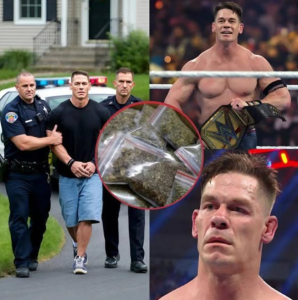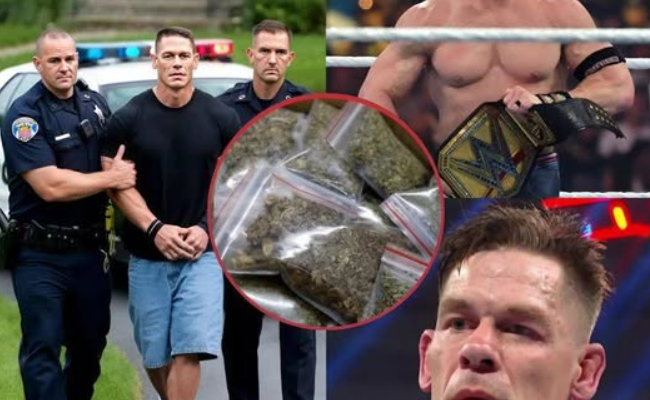
John Cena

A viral post circulating on social media recently claimed that U.S. police had raided John Cena’s home, seizing large quantities of illegal drugs and making arrests. Here’s a breakdown of what the rumor says, what we actually know at this time, and how to approach such claims with caution.
What the rumor claims
-
Posts (primarily on Facebook, Threads, and other platforms) claim that “15 minutes ago” U.S. law-enforcement officers raided Cena’s house, recovered “5 kg of growth s-t-i-m-ulants” (a misspelling/manipulation of “stimulants”), or large amounts of hard drugs: “350 pounds of crystal methamphetamine, 2 kg cocaine, six assault …” per one version.
-
The posts often include no credible link to any real news outlet, no official record, and use alarmist language (“latest news,” “breaking,” “just now”).
-
Some versions show a photo or video thumbnail with Cena’s image, overlay text like “Police ARREST John Cena 2025!” or similar sensational banners.
What is actually known
-
A search of major, reliable news outlets (e.g., mainstream media, entertainment-news aggregators) reveals no credible report of police raiding Cena’s home or being arrested.
-
The social-media posts cited above are unverified, contain inconsistent details, and appear to have the hallmarks of viral clickbait (urgent timestamp, sensational claims, minimal sourcing).
-
On forums and communities focused on wrestling and celebrity news, users have noted that Cena has no publicly known legal scandals of this severity. For example, one user commented:
“John Cena has never seemed to be involved in any legal scandals or illegal behaviour.”
-
The absence of any official statement from Cena’s representatives, from law-enforcement agencies, or from credible news outlets strongly suggests the claim is false or at least unproven.
Possible reasons the rumor spread
-
Clickbait/gossip economy: Celebrities with large followings (like Cena) often become targets for fabricated or exaggerated rumors because they attract attention and shares.
-
Mis-/disinformation: Some posts purposely claim “just now” or “exclusive” to make users feel urgency, encouraging sharing before any fact-checking.
-
False recycling: The same claim (police raid, large seizure) appears in multiple iterations with slight changes, suggesting copy-and-paste viral propagation rather than genuine news.
-
Confusion with genuine arrests: Occasionally, unrelated incidents or arrests are misattributed to a celebrity to boost engagement. Because no credible link has been established in this case, mis-attribution is a likely component.
Why we still need to be cautious
-
Just because nothing has been reported yet doesn’t prove something never happened—but in this case, the lack of coverage from reputable sources strongly argues against it.
-
Celebrities can face legal trouble that takes time to surface publicly; however the nature of this claim (large drug‐seizure raid) makes it extremely unlikely to remain hidden.
-
Social‐media algorithms amplify sensational claims before verification, which means many people may see the rumor and assume it’s true.
-
Reposting or forwarding unverified claims contributes to confusion and spreads disinformation.
How to evaluate such rumors yourself
-
Check credible news outlets: Search for the celebrity’s name + “arrest”, “raid”, “police”, along with the date. If only social‐media posts show it and no mainstream coverage, treat with skepticism.
-
Look for official statements: Celebrity reps, law-enforcement agencies, or their publicists often issue denials or confirmations if an incident is real.
-
Examine the source of the post: Is it from a known website? A random Facebook group? The timestamp “15 minutes ago” is often a red flag.
-
Check for consistency: Many viral rumors have varying details (different amounts, different substances, different dates). That inconsistency often signals fabrication.
-
Be cautious about sharing: Before forwarding or reposting, ask: Do I trust this? Could it be wrong? Am I adding more noise?
What the implications would be (if true)
If credible evidence were to emerge that Cena’s home was raided and a major drug-seizure occured, the implications would be significant:
-
Legal: Charges could include possession, trafficking, conspiracy, depending on the nature of the seizure.
-
Reputation: Cena’s brand (both as a wrestler/actor and a public figure) would suffer major fallout.
-
Media scrutiny: Such an event would generate wide‐spread coverage across major outlets, not just niche sites.
Because none of this has surfaced, the lack of evidence suggests the claim is almost certainly untrue.
In summary
While the viral claim that John Cena’s home was raided by police is spreading quickly across social media, there is no credible evidence supporting it at this time. The claim appears to be a piece of sensational clickbait or mis-information rather than a real event. Unless and until reputable outlets provide verified reporting or Cena’s team issues something official, the responsible position is: the claim is unverified and likely false.
If you’d like, I can check for any legal filings or records related to Cena in recent years (publicly available) to further confirm there’s no credible basis for the rumor. Would you like me to do that?

